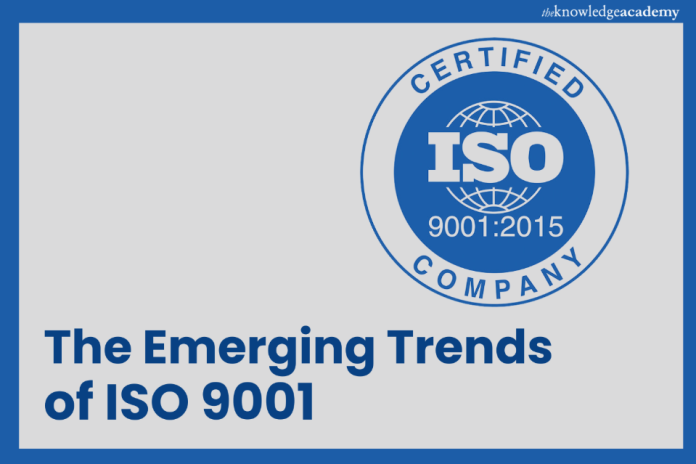Imagine being at the forefront of quality management innovation. That is exactly what ISO 9001 offers. Whether an experienced professional or a curious learner, ISO 9001 Course can help you understand this transformative standard and stay ahead of the upcoming trends and potential changes. But What is ISO 9001, and how are the exciting changes and trends shaping its future? Let us discuss it in the following blog.
Table of Contents
- What is ISO 9001
- ISO 9001 Trends You Should Know
- Conclusion
What is ISO 9001
ISO 9001 is a globally recognised standard for quality management systems that helps organisations consistently meet customer and regulatory requirements. It offers a structure for optimising operations and producing superior goods or services. Regardless of size, all businesses must follow it to ensure customer satisfaction. The rules are based on leadership and systematically handling risks and chances.
ISO 9001 Trends You Should Know
Let us discuss the emerging trends bring potential changes in ISO 9001:
- Driving Digital Transformation in Quality Management
Digital technologies are transforming every business, including quality management. ISO 9001 is balanced to include technology such as AI and machine learning to improve quality procedures. In the future, we could see guidelines on:
- Utilising AI for quick management of quality indicators.
- Employing data analytics to anticipate dangers before their emergence.
- Incorporating digital technologies like cloud-based systems and optimising audits.
- Utilising automation to minimise human error and enhance consistency.
- Enhancing digital dashboards for the smooth monitoring and dissemination of quality data.
For organisations already investing in technology, this shift will make compliance more dynamic and effective. It will facilitate new strategies for tackling quality concerns, allowing organisations to maintain a competitive edge in the digital era.
- Sustainability: A Key Priority for Quality Standards
As sustainability becomes a business necessity, ISO 9001 will incorporate eco-friendly practices. Expect a focus on:
- Minimising environmental impact via effective quality management.
- Conforming to standards such as ISO 14001 to establish integrated systems.
- Promoting the use of sustainable resources in manufacturing processes.
- Advocating for energy-efficient practices within quality management systems.
- Supporting circular economy principles by minimising waste and reusing materials.
Organisations that adopt this trend will adhere to regulations and attract environmentally aware customers. Integrating sustainability into quality management procedures enables firms to enhance their reputation and positively impact global environmental objectives.
- Risk Management Goes Beyond Basics
The risk-based thinking used in ISO 9001:2015 revolutionised organisational approaches to uncertainty. Future updates might expand on this, focusing on:
- Thorough methods for addressing global difficulties such as supply chain interruptions.
- Anticipatory recognition of dangers with predictive analytics.
- Developing resilience to adjust to unforeseen circumstances swiftly.
- Developing detailed risk heatmaps to prioritise and mitigate vulnerabilities.
- Integrating scenario planning for long-term risk mitigation.
This evolution will equip businesses to stay competitive, even in turbulent times. An intensified focus on risk management will enable companies to function with enhanced confidence and stability.
- Tailored Approaches for Different Industries
A universal solution is only sometimes effective. ISO 9001 evolves to provide:
- Industry-specific regulations for industries such as healthcare and manufacturing.
- Practical tools for navigating distinct regulatory mandates.
- Adaptable frameworks that accommodate various operating requirements.
- Industry-specific case studies and best practices to simplify implementation.
- Supplementary assistance for sectors experiencing rapid technological transformations.
These tailored approaches will make implementation smoother and more impactful. By closely connecting standards with industry requirements, ISO 9001 will ensure relevance and efficacy across various industries.
- Fostering a Quality-Driven Culture
Quality transcends methods; it embodies an attitude. Future revisions of ISO 9001 might delve into:
- Approaches for integrating quality at all organisational levels.
- Promoting leadership advocates for a culture of continuous improvement.
- Improving employee engagement to elevate performance and results.
- Offering tools for evaluating and enhancing corporate culture.
- Recognising and rewarding quality-focused practices within teams.
A quality-driven culture ensures long-term success and a stronger reputation. Organisations prioritising cultural transformation will find meeting and exceeding quality standards easier.
6.Embracing Emerging Technologies
The rapid advancement of innovation necessitates flexibility. ISO 9001 can soon include directives regarding the following:
- Using blockchain for secure and transparent quality management.
- Integrating IoT devices to monitor real-time performance data.
- Employing digital twins for testing processes before implementation.
- Exploring Augmented Reality (AR) for training and quality assurance.
- Leveraging robotics to enhance precision in production and inspections.
By using these technologies, enterprises can maintain a competitive advantage. Incorporating advanced technologies will transform the execution and oversight of quality management.
- Resilience in a Changing World
Given global risks such as pandemics and climate change, resilience is essential. ISO 9001 implement strategies to:
- Construct flexible quality management systems.
- Tackle issues associated with remote work and distributed operations.
- Expect potential interruptions with comprehensive contingency planning.
- Foster cross-functional collaboration to improve organisational agility.
- Introduce guidelines for monitoring resilience metrics over time.
This forward-thinking approach will help organisations thrive in any scenario. Resilience-focused strategies will enable businesses to maintain their quality commitments regardless of external challenges.
Conclusion
The future of ISO 9001 includes more than just compliance. It pertains to prioritising quality, sustainability, and innovation. Whether you’re a professional looking to enhance your knowledge or an organisation aiming to improve, understanding these trends is crucial.
The Knowledge Academy offers free resources to equip you with the latest insights and tools to navigate these changes confidently. Start building your expertise today and be part of the future of quality management.


